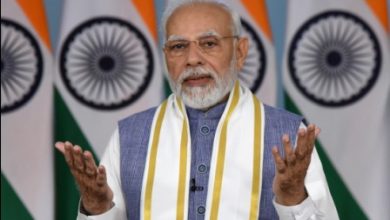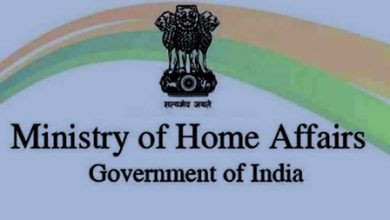Yellow journalism seeks to cloud the facts by resorting to eye-catching headlines and promotes distortion and misinformation : .Venkaiah Naidu

Media in crisis, auto-correction needed to tide over disruptive challenges and uncertain future, says Vice President Shri M. Venkaiah Naidu
Naidu urges media to focus on triggers of development and change
Expressing concern over the future of media and journalism and the sanctity of news in the face of disruptive technological advances, Vice President of India and Rajya Sabha Chairman M.Venkaiah Naidu has urged all the stakeholders to ensure credible journalism since media is an effective tool of empowerment of people for informed public discourse.
Naidu spoke at length on “Journalism: Past, Present and Future’’ while delivering the M.V.Kamat Memorial Endowment Lecture in virtual mode from Hyderabad today.
The Vice President listed the concerns about media and journalism as issues relating to; Freedom of press, censorship, flouting of norms of reporting, social responsibility of journalists, decline in the values and ethics of journalism, yellow journalism, journalism of false crusades, reporting for profit, disinformation in the form of fake and paid news, disruptions caused by the Internet and the future of media amidst these concerns and challenges.
Naidu said; “Yellow journalism seeks to cloud the facts by resorting to eye-catching headlines and promotes distortion and misinformation. Journalism based on taking up false crusades as witnessed in the case of suicide of a film actor recently, is a fellow traveler. Both are aimed at increasing readership and viewership and should be avoided.”
The Vice President voiced concern over the implications of the growing ‘instant journalism’ triggered by the emergence of Internet and social media expansion in the form of propagation of fake news and erosion of journalistic norms and ethos. He further noted that technology giants have emerged as algorithmic gatekeepers of information and the web emerging as the main distributor of news. Shri Naidu, in particular, referred to the financial implications for the traditional media like the newspapers with their journalistic products being leveraged by technology giants and not sharing the revenues with the concerned. He noted that the Internet has disrupted the revenue and reporting models with serious implications.
Naidu stated that “The information and reports generated by the print media at substantial cost is being hijacked by the social media giants. This is unfair. Some countries are taking measures to ensure revenue sharing by the social media giants with the print media. We too need to take a serious look at this problem and come out with appropriate revenue sharing models for the survival of traditional media.”
Referring to the newspapers as the dominant modes of information dissemination and empowerment of people since the 18th century and after the emergence of radio and television in the 20th century, Shri Naidu said that even during the present era of Internet, “There are millions still who like to wake up with a cup of coffee and a newspaper. I shall admit that I am one among them but without coffee.”
Welcoming the democratisation and decentralisation of sharing of information and views enabled by rapid expansion of social media, Shri Naidu expressed concern over the downsides of it in the form of news getting devalued amidst information saturation and over abundance of news. He said; “There is a certain need to ensure sanity in the use of rapidly expanding social media outlets given the implications for social harmony, common good, peace, and national security. Freedom of expression doesn’t mean unfettered outburst of anger and hate against each other that may lead to chaos.”
Referring to the role of media in reporting and analysing the socio-political and economic transformation of the country, Shri Naidu urged the media persons to be consistent in reporting such change instead of using different yardsticks for different periods. He said; “I am not suggesting media to be like a chameleon. Media should use a standard set of reporting and analytical tools that capture the change without imposing respective positions. Media should not be seen by the public as discrediting the change that is happening since such a change is contrary to their long-held positions.”
Elaborating on this, Naidu said that whatever change has been happening in the country over the last few years, is within the framework of the Constitution and has contextual relevance. “To briefly recall this context, after about 35 years of political stability after independence, there was a certain instability in between before stability was restored. These changes ran parallel to the changes in the perceptions, perspectives and positions of the people with the passage of time. This transformation was founded on the way various issues and challenges have surfaced from time to time, the way they were articulated and dealt with by those in power and media should not be seen as refusing to acknowledge this changing narrative.”
Stressing that nation-building is a work in progress which needs to be pursued with enhanced vigour and missionary zeal collectively, Shri Naidu said that such an effort called for a strong sense of nationalism and nationalist spirit that binds all Indians together. He further said: “It is not correct to weaken this spirit by attributing the non-existent divisive perspectives. Media shall highlight with all the vigour the aberrations if any, so that they are not allowed to recur. Presenting every incident or issue in a divisive perspective does immense harm to the goal of building a strong, resurgent and developed India.”
Referring to the ability of media to shape right public perceptions and perspectives, Shri Naidu urged the media to be a part of the solution and not part of the problem since like every citizen, government and other stakeholders, media too have a certain responsibility towards the nation.
Referring to the crisis situation being faced by the media and journalism for various reasons and uncertain future amidst disruptive changes, Shri Naidu stressed that an ‘auto-correction’ in needed and in fact, inevitable for a better future. He suggested enabling guidelines and regulations for restoring order while expressing himself against any restrictive regulations.
Naidu also urged the media to give adequate attention to reporting on developmental efforts and outcomes by examining and analysing the triggers of change, partnerships built and participation of people and other stakeholders, challenges faced and the way they were overcome etc. “This kind of positivity reinforces the trust of the people in the institutions of our body polity” he said.
The Vice President urged the media persons to keep news and views strictly separate without allowing each of them masquerading as the other. He also stressed the need to stem the decline in journalistic values and ethos. He recalled that late Shri Kamat although maintained this distinction between news and views. Paying rich tributes to the multifarious contributions of the veteran journalist, Shri Naidu said that late Shri Kamat became iconic through his principles and practices during his long career and earned respect both within and outside the country.
Noting that journalism has emerged as a very demanding, challenging and specialised profession, Shri Naidu paid tributes to all those who had contributed to the growth of journalism in the country and complimented all those who are choosing journalism as the first professional option. He stressed on the need for creating an enabling working environment for journalism and media persons to give out their best.
Naidu also complimented the media organisations for standing up to the crisis unleashed by the COVID-19 pandemic and sustaining the cause of empowerment of the people.
Hon’ble Pro Vice Chancellor of Manipal Academy of Higher Education (MAHE) Dr. H.S. Bhallal, Vice Chancellor Lt. General M.D. Venkatesh, Director of Manipal Institute of Communication Dr. Padma Rani and members of administrative and academic departments were among those who attended the event.




